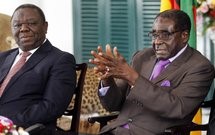 Zimbabwe's proposed constitution, which could be submitted for a national vote on March 16, may create more problems than it solves. It likely will pave the way for national elections in July, a process many hope will fare better than the last round.
Zimbabwe's proposed constitution, which could be submitted for a national vote on March 16, may create more problems than it solves. It likely will pave the way for national elections in July, a process many hope will fare better than the last round.
Indeed, presidential and parliamentary elections in 2008 were very contentious, ultimately resulting in a coalition government led by President Robert Mugabe and his Zimbabwe African National Union-Patriotic Front. The front's main coalition partner is the Movement for Democratic Change, which is led by Prime Minister Morgan Tsvangirai.
The proposed constitution discusses a partition of powers and introduces presidential term limits, but because it does not bar incumbents from being a candidate, Mugabe could retain his post for 10 more years. Since the president is now 88 years old, it is unclear how long he will remain president. Mugabe has not yet chosen a clear-cut successor, so it is possible, albeit unlikely, that the Movement fro Democratic Change could take office. The outcome of the presidency will affect Zimbabwe's mining export industry.
The Mugabe regime does not want to lose power to the Movement for Democratic change, but it understands that it could benefit from holding elections sooner rather than later. The fear of losing to the opposition stems not only from a loss of perks but a loss of the power to defend themselves from political retribution. The Zimbabwean president will have to vacate his post at some point either by death or by his own volition. Should he die in office, the ruling party is permitted to appoint a replacement to serve out the remainder of the presidential term. Holding an election while Mugabe is alive helps to maximize the party's ability to win that election. Conversely, introducing a new presidential candidate risks losing voters. The Zimbabwe African National Union-Patriotic Front would rather have a successor to Mugabe after the July election. This would give the party upwards of five years to consolidate behind a new leader without holding a fresh election.
There are several presidential aspirants within the ruling party. Among them are Vice President Joyce Mujuru and party chairman Simon Moyo. But the person most likely to be chosen to succeed Mugabe is Defense Minister Emmerson Mnangagwa. One of the faces of the regime, Mnangagwa strictly enforced the party's control of the country despite the economic decline and the demands of the coalition government following the controversial 2008 elections.
Different Policies
The fate of the country's mining industry, its chief export, partly depends on who gains power. Zimbabwe's Ministry of Youth Development, Indigenization and Economic Empowerment -- currently under the ruling party's control -- requires any foreign company with assets in Zimbabwe valued over $500,000 to sell a 51 percent stake to local Zimbabweans (some of which goes to the youth ministry). In January, Harare seized almost 28,000 hectares (about 69,000 acres) of land from Zimplats, a platinum mining company, which was negotiating with Harare to increase the Zimbabwean stake in their mines to the required 51 percent by July. This has resulted in fears that Harare may seize other mining assets under the same economic plan.
Furthermore, the Zimbabwean ruling party has given platinum miners a two-year deadline to bring platinum processing and refinery plants to Zimbabwe -- under indigenous Zimbabwean ownership -- instead of processing the raw ore in neighboring South Africa. Platinum buyers are now worried that the world's third-largest platinum producer will suffer a supply crunch as mining companies spend more money on constructing new plants rather than on increasing mine productivity. Refining platinum is an energy-intensive process, and Zimbabwe sorely lacks adequate electricity infrastructure.
In late 2012, the Movement for Democratic Change unveiled a new economic plan that would reverse these policies. The Mugabe regime immediately rejected the plan. The indigenous ownership program is aimed at appealing to the country's rural population -- which constitutes roughly two-thirds of the country's overall population -- in whom land ownership and mine nationalization resonate. Economic nationalization programs are consistently threatened because of their popular appeal, but they are inconsistently enforced. The government does not want to antagonize what foreign investment there is in Zimbabwe. In any case, they are significant tools to raise voter support.
Tsvangirai's plan is to invest in jobs in urban areas -- his traditional base is among unionized labor -- but much of his plan has not been announced. Mostly he is highlighting goals he wants to achieve. While the opposition party may be able to challenge the ruling party in urban areas by arguing over the direction of the Zimbabwean economy, the Zimbabwe African National Union-Patriotic Front will likely intimidate and extort enough votes in urban and rural areas to safeguard another term in office.
Courtesy : Stratfor (www.stratfor.com)